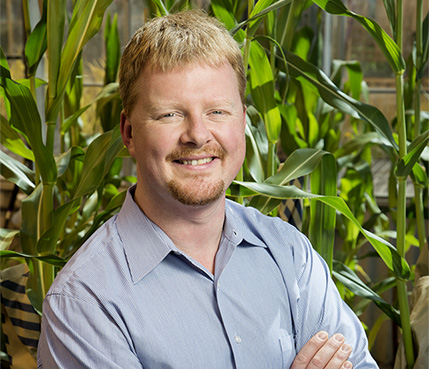U.S. Department of Energy grant to fund sorghum research at Illinois
An Illinois professor is part of a multi-institutional research project that has received a 5-year, $16 million grant from the U.S. Department of Energy (DOE) to work with sorghum in an effort to optimize photosynthesis and water use efficiency.
Andrew Leakey, professor in the Department of Plant Biology and IGB faculty in the Genomic Ecology of Global Change research theme, is part of the project, based at the Donald Danforth Plant Science Center, that will expand upon earlier research on green foxtail grass (Setaria viridis) to identify new genes and pathways that contribute to photosynthesis and enhanced water use efficiency. Sorghum, a grass grown worldwide, is a particularly ideal crop to research for solar energy conversion and use of water.
The research team—which also includes researchers from Washington State University, Carnegie Institution for Science, University of Rhode Island, University of Minnesota, and the United States Department of Agriculture—will then deploy these genes using tools of the emerging field of synthetic biology to accelerate development of elite energy sorghum varieties for production under marginal environments.
“Understanding the network of genes involved in photosynthesis and drought tolerance will provide targets for plant breeders and genetic engineers to re-design sorghum specifically as a high value bioenergy feedstock to be grown on marginal soils and thus not compete with food crops,” said lead principal investigator, Thomas Brutnell, director of the Enterprise Rent-A-Car Institute for Renewable Fuels at the Danforth Center.

According to Leakey, Illinois will receive approximately $2.1 million of the DOE grant to contribute to the project.
"New infrastructure for experimentally manipulating water supply to large field-grown crops at the University of Illinois will be leveraged, along with advances in phenotyping crop carbon and water relations, in order to develop and field-test high water use efficiency sorghum," he said.
This project aims to deliver stress-tolerant sorghum lines, addressing DOE's mission in the generation of renewable energy resources. The development of a low input, environmentally safe and highly productive sorghum germplasm will help establish a lignocellulosic energy economy that can provide jobs to rural communities, ensure energy security and benefit the environment.
Sorghum is a member of the grass family and is grown worldwide. Sorghum is very resilient to drought and heat stress. Natural genetic diversity in sorghum makes it a promising system for identifying stress-resistance mechanisms in grasses that may have been lost during the domestication of related cereal crops. It is among the most efficient crops in conversion of solar energy and use of water, making it an ideal crop to target for improvement.
Founded in 1998, the Donald Danforth Plant Science Center is a not-for-profit research institute with a mission to improve the human condition through plant science. Research, education and outreach aim to have impact at the nexus of food security and the environment, and position the St. Louis region as a world center for plant science. The Center’s work is funded through competitive grants from many sources, including the National Institutes of Health, U.S. Department of Energy, National Science Foundation, and the Bill & Melinda Gates Foundation.
The Department of Plant Biology at Illinois is part of the School of Integrative Biology.
